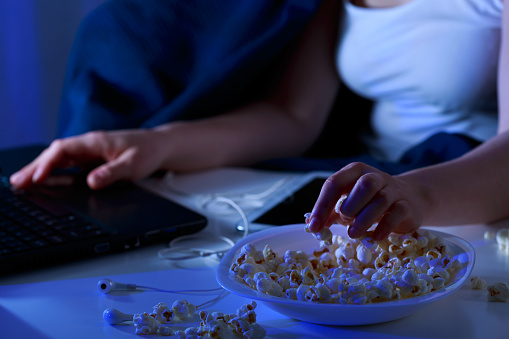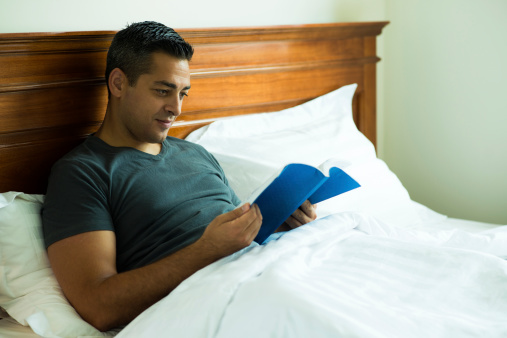What Time Should You Stop Eating at Night?
Article posted in: Lifestyle
Remember this old joke: If having a midnight snack is so bad, why is there a light in the refrigerator?
Funny, yes. Not so funny? The weight gain that often accompanies eating at night.
There’s a good scientific reason why most studies show that anything eaten outside a person’s normal sleep cycle turns to fat. Blame it on circadian rhythm, our internal clock that processes food differently at different times of the day and night, according to a number of animal studies. Along with absorption and digestion of food, that clock also controls everything from body temperature, hormone levels to all kinds of biochemical reactions.
If you’re following your body clock, you may need to move up the time you eat the big meal of the day. A 2013 Spanish study of 420 overweight and obese people found that those who ate their major meal of the day after 3 p.m.—mid-afternoon!—lost less weight than those who ate it before 3 p.m. (17 pounds vs. 22 pounds, all other things being equal, over 20 weeks).
The same research team also learned that people who ate a “late lunch” after 4:30 p.m. burned fewer calories after the meal while they were digesting (digesting your food burns calories too) than those who lunched at 1 p.m. They also didn’t burn off carbohydrates as well as the early lunchers and had lower glucose tolerance, a condition that can be a precursor of diabetes.
And late-night eaters? Studies have consistently found that they’re heavier than people who don’t eat at night. One study found that people who ate between 11 p.m. and 5 a.m.—some of whom may be shift workers—gained more weight than those who didn’t eat at night.
Shift work is one thing, but the real issue for those of us with 9 to 5 jobs is what we eat at night. It’s usually not a big salad or a bag full of broccoli and dip. Usually it’s a carb, salty or sweet, that gives us quick energy to stay up to catch the Late Show. The result: Lots of sugar coursing through the bloodstream and no way to use it as fuel. Couch surfing and sleeping aren’t taxing enough, and your body isn’t producing enough insulin—the hormone that helps blood sugar get to your cells—to take it where it belongs.
Eating a big meal at bedtime can also trigger heartburn or esophageal reflux and can keep you up at night, which almost inevitably leads to overeating the next day, many studies have found.
If night eating is an issue for you, here’s how to cope:
1. Don’t let hunger build up.
When you’re busy with work and family, it’s easy to forget to eat. When you’re trying to lose weight, it’s also tempting to skip meals to make the pounds drop off faster. But you’re just chasing your hunger into the night where eating becomes an even bigger problem. Eat three good meals and a couple of snacks at appropriate times during the day so evening hunger stops being an issue.
2. Get a good night’s sleep.
A study done at St. Luke Roosevelt Hospital Center and Columbia University in New York found that the pleasure centers in the brains of volunteers who were sleep deprived for five days lit up in a magnetic resonance imaging scan when they looked at pictures of junk food. It didn’t happen when they’d all gotten plenty of sleep. Another study found that the decision-making parts of the brain lie low when people have missed sleep. That explains why other research has found that sleepy people crave fatty, sugary food and consistently make what the researchers call “poor food choices.”
3. Eat dinner like a pauper.
You may not be able to eat dinner at 3 p.m., but you can follow the old adage: “Eat breakfast like a king, lunch like a prince, and dinner like a pauper.” Have your major meal at mid-day, which is standard in some cultures, and eat lighter at night.
4. Make your late-night snack protein.
Several studies have found that a small, late-night snack can be helpful. Not only can it quell hunger that can keep you awake, it can boost your metabolism and curb early morning appetite. It has other benefits too. A Florida State University study of 44 healthy young men found that those who had a 150-calorie protein shake before bed gained more strength and muscle mass from a strength-training program than those who didn’t have a nighttime shake. A similar shake also helped a group of women feel less hungry in the morning—plus get better results out of their exercise program. Unlike sweet or salty snacks, the protein is less likely to boost your glucose levels. While your blood sugar system doesn’t work as well at night as it does in the daytime, muscle repair and construction is the body’s regular nighttime occupation.
5. Keep it small.
The studies that showed a benefit to late-night snacking all looked at snacks that were under 200 calories. If you have a rough day and can’t control your eating times, save one of your protein snacks for the late-night munchies.











